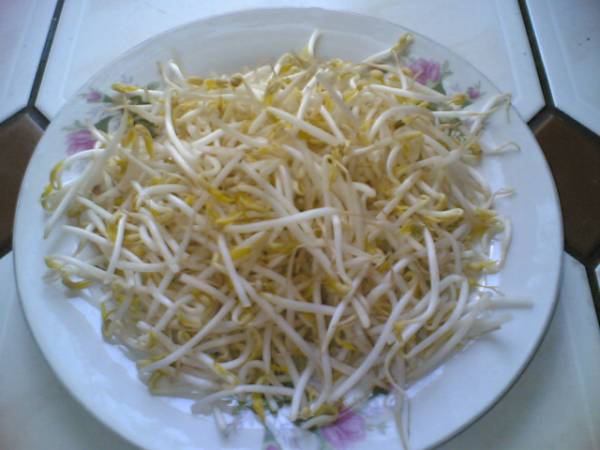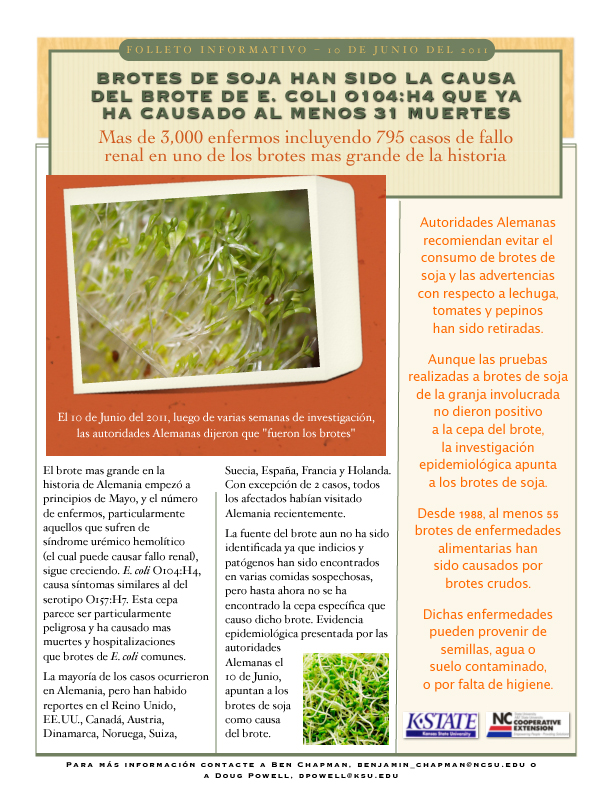While chatting with Virginia, my hair artiste, during my annual visit yesterday, she asked if I knew anything about that sprout thing.
I said, “It’s one of the few foods I won’t eat.”
.jpg) “But I love sprouts.”
“But I love sprouts.”
“OK, that’s your choice. I’m just providing information.”
The media accounts and public health actions surrounding the German-based E. coli O104 outbreak that has killed 33 people and sickened over 3,000 have been abysmal.
Like the Walkerton E. coli O157:H7 outbreak in 2000, too many are using the filters of their own politics to advance their own causes and saying too many dumb things.
It’s really about the biology.
German hospitals are overwhelmed with the 3,100 sick people; more than 700 have developed hemolytic uremic syndrome. In normal times, hospitals need between 500 to 700 portions of blood plasma in 14 days, they used 12,000 portions in the last two weeks.
“Our staffers are used to seeing very severe cases. But to see those young, healthy girls break down from one day to the next, getting cramps and slipping into coma — that’s been the most stressful thing ever.”
Today it was reported, “Around 100 patients have suffered such terrible kidney damage that they will require a transplant or have to undergo dialysis for the rest of their lives.”
We count at least 55 outbreaks related to raw sprouts beginning in the U.K. in 1988, sickening thousands.
The first consumer warning about sprouts was issued by the U.S. Centers for Disease Control (CDC) in 1997. By July 9, 1999, the U.S. Food and Drug Administration had advised all Americans to be aware of the risks associated with eating raw sprouts. Consumers were informed that the best way to control the risk was to not eat raw sprouts. The FDA stated that it would monitor the situation and take any further actions required to protect consumers.
At the time, several Canadian media accounts depicted the U.S. response as panic, quoting Health Canada officials as saying perhaps some were at risk, but that sprouts were generally a low-risk product.
That changed in late 2005, as I was flying back to reunite with this girl I met in Kansas and 750 people in Ontario became sick from raw bean sprouts.
Virginia had heard about the chasing-Amy tale, she knew nothing about the food safety risks with raw sprouts.
That’s normal: what food safety types think passes for common knowledge barely registers as public knowledge. It’s hard to compete against food porn.
Sprouts present a special food safety challenge because the way they are grown — high moisture and high temperature — also happens to be an ideal environment for bacterial growth.
Because of continued outbreaks, the sprout industry, regulatory agencies, and the academic community in the U.S. pooled their efforts in the late 1990s to improve the safety of the product, including the implementation of good manufacturing practices, establishing guidelines for safe sprout production and chemical disinfection of seeds prior to sprouting.
But are such guidelines actually being followed? And is anyone checking? Doubtful.
There’s a Jimmy John’s around the corner from where Virginia cuts my hair. Earlier this year, sprouts served on Jimmy John’s sandwiches supplied by Tiny Greens sickened 140 people .jpg) with salmonella, primarily in Indiana.
with salmonella, primarily in Indiana.
In Jan. 2011, Jimmy John’s owner John Liautaud said his restaurants would be replacing alfalfa sprouts with allegedly easier-cleaned clover sprouts, effective immediately.
This was one week after a separate outbreak of salmonella on sprouts sickened eight people in the U.S. northwest who ate at Jimmy John’s that used clover sprouts.
Virginia said she’d never eat at Jimmy John’s again.
Sprout grower Bill Bagby, the dude who owns Tiny Greens and apparently imagines he has huge cast-iron balls, said in the context of the German outbreak that, for many like him, the nutritional benefits outweigh the risk.
"Sprouts are kind of a magical thing.”
"That’s why I would advise people to only buy sprouts from someone who has a (foodsafety) program in place" that includes outside auditors, Bagby said. "We did not have (independent auditors) for about one year and that was the time the problems happened. The FDA determined that unsanitary conditions could have been a potential source of cross-contamination and so we have made a lot of changes since then."
Independent auditors? Like the ones who said everything was cool, everything was OK, at Peanut Corporation of America (7 dead, 700 sick) and DeCoster eggs (2,000 sick).
But with all the dead and sick and dying related to the German outbreak, why not make a political point.
Like Mark Kastel of the Cornucopia Institute, who suggested that concerned consumers might be better off choosing organic sprouts over non-organic varieties because the majority of outbreaks during the last three years came from conventional farms. Bagby, an organic farmer noted that their inspection process is more rigorous than conventional farms.
Organic is a production standard, not a food safety standard.
It’s not an organic-conventional thing; it’s a sprouts-make-people-barf thing.
Arm-chair epidemiologist and N.Y. Times writer Mark Bittman decided to share his vast food safety knowledge (again) in a June 7/11 piece titled, Don’t blame the sprouts, in which he .jpg) decided to use the German outbreak to advance the cause of grass-fed beef.
decided to use the German outbreak to advance the cause of grass-fed beef.
It goes back to biology.
E. coli O157:H7 and its cousins are generally found in about 10 per cent of ruminants – cows, sheep, goats, deer. There are outbreaks of human disease related to all; the U.S. happens to have more cattle than other ruminants. There’s a lot of dangerous E. coli out there. But there are some basics when people start getting sick.
“I’m just staggered,” said William E. Keene, a senior epidemiologist of the Oregon Public Health Division. “This is basic outbreak investigation 101. This is on the high end of suspect vehicles. You always rule out raw milk, you always rule out ground beef, you always rule out sprouts. It just happens in the beginning steps.”
Virginia told me I had some mullet action going on and it had to go.
And she’d reconsider sprouts.
An updated table of international sprout-related outbreaks is available at :?http://bites.ksu.edu/sprouts-associated-outbreaks?
.jpg) some of the most stringent safety procedures in the food industry, and have sophisticated systems in place to minimize the likelihood of contamination.”
some of the most stringent safety procedures in the food industry, and have sophisticated systems in place to minimize the likelihood of contamination.”
.jpg) more patient died.
more patient died. .jpg) “But I love sprouts.”
“But I love sprouts.”.jpg) with salmonella, primarily in Indiana.
with salmonella, primarily in Indiana..jpg) decided to use the German outbreak to advance the cause of grass-fed beef.
decided to use the German outbreak to advance the cause of grass-fed beef..jpg) and trade partners shall now have full confidence as regards the safety of EU’s vegetables."
and trade partners shall now have full confidence as regards the safety of EU’s vegetables.".jpg) There’s lots of various E. coli out there
There’s lots of various E. coli out there.jpg) en cause n’ont pas détecté la souche épidémique, l’épidémiologie a fait le lien entre la consommation de graines germées et la maladie.
en cause n’ont pas détecté la souche épidémique, l’épidémiologie a fait le lien entre la consommation de graines germées et la maladie. Further verification is pending.
Further verification is pending. – Desde 1988, al menos 55 brotes de enfermedades alimentarias han sido causados por brotes crudos.
– Desde 1988, al menos 55 brotes de enfermedades alimentarias han sido causados por brotes crudos..jpg) of patients who had fallen sick to 26 restaurants and cafeterias that had received produce from the organic farm.
of patients who had fallen sick to 26 restaurants and cafeterias that had received produce from the organic farm.